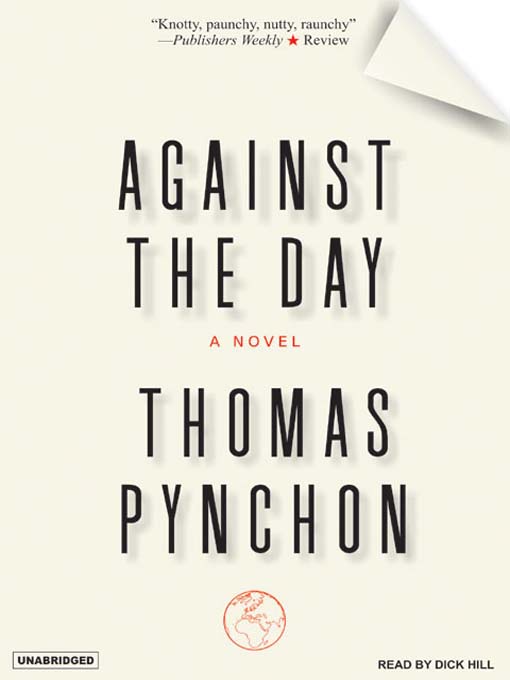
Against the Day
- اطلاعات
- نقد و بررسی
- دیدگاه کاربران
نقد و بررسی

Listeners navigating Pynchon's latest magnum opus could easily be thrown off by the multitude of characters, themes, and events in this novel that spans several decades around the cusp of the twentieth century. From bomb-throwing anarchists to greedy capitalists, from miners to "pavement nymphs," from adventurers to mystics, reader Dick Hill works wonders as he portrays this cast of hundreds who wend their way through a dense yet always intriguing story. With a palette of voices that not only capture the unique traits of each character but make them all stand out, and with narration that keeps the story flowing, listeners who persevere through this long novel will find both the story and the performance immensely rewarding. K.M. (c) AudioFile 2007, Portland, Maine

Starred review from October 30, 2006
Knotty, paunchy, nutty, raunchy, Pynchon's first novel since Mason & Dixon
(1997) reads like half a dozen books duking it out for his, and the reader's, attention. Most of them shine with a surreal incandescence, but even Pynchon fans may find their fealty tested now and again. Yet just when his recurring themes threaten to become tics, this perennial Nobel bridesmaid engineers another never-before-seen phrase, or effect, and all but the most churlish resistance collapses.
It all begins in 1893, with an intrepid crew of young balloonists whose storybook adventures will bookend, interrupt and sometimes even be read by, scores of at least somewhat more realistic characters over the next 30 years. Chief among these figures are Colorado anarchist Webb Traverse and his children: Kit, a Yale- and Göttingen-educated mathematician; Frank, an engineer who joins the Mexican revolution; Reef, a cardsharp turned outlaw bomber who lands in a perversely tender ménage à trois; and daughter Lake, another Pynchon heroine with a weakness for the absolute wrong man.
Psychological truth keeps pace with phantasmagorical invention throughout. In a Belgian interlude recalling Pynchon's incomparable Gravity's Rainbow
, a refugee from the future conjures a horrific vision of the trench warfare to come: "League on league of filth, corpses by the uncounted thousands." This, scant pages after Kit nearly drowns in mayonnaise at the Regional Mayonnaise Works in West Flanders. Behind it all, linking these tonally divergent subplots and the book's cavalcade of characters, is a shared premonition of the blood-drenched doomsday just about to break above their heads.
Ever sympathetic to the weak over the strong, the comradely over the combine (and ever wary of false dichotomies), Pynchon's own aesthetic sometimes works against him. Despite himself, he'll reach for the portentous dream sequence, the exquisitely stage-managed weather, some perhaps not entirely digested historical research, the "invisible," the "unmappable"—when just as often it's the overlooked detail, the "scrawl of scarlet creeper on a bone-white wall," a bed partner's "full rangy nakedness and glow" that leaves a reader gutshot with wonder.
Now pushing 70, Pynchon remains the archpoet of death from above, comedy from below and sex from all sides. His new book will be bought and unread by the easily discouraged, read and reread by the cult of the difficult. True, beneath the book's jacket lurks the clamor of several novels clawing to get out. But that rushing you hear is the sound of the world, every banana peel and dynamite stick of it, trying to crowd its way in, and succeeding.

July 1, 2007
Pynchon ("Mason & Dixon") has once again produced a work of note. His portrait of a sizable number of characters living in the volatile period from 1893 to post-World War I is equally epic and surreal (and sometimes a bit confusing). It is multilayered and filled with foreshadowing and numerous interesting subplots. Strangely, it is at the same time sadly realistic and idealistic, intellectual and humorous (mostly droll), fictitious and historical. In other words, this is pure Pynchon as he illustrates the arc of the human spirit. The performance of reader Dick Hill is nothing short of masterly; his ability to convey emotion and believable accents over so lengthy and complex a work and yet hold the listener's interest is remarkable. Recommended for those with the patience to stick with the novel to the end, though often this may seem like a challenge.Scott R. DiMarco, Mansfield Univ. of Pennsylvania
Copyright 2007 Library Journal, LLC Used with permission.




دیدگاه کاربران